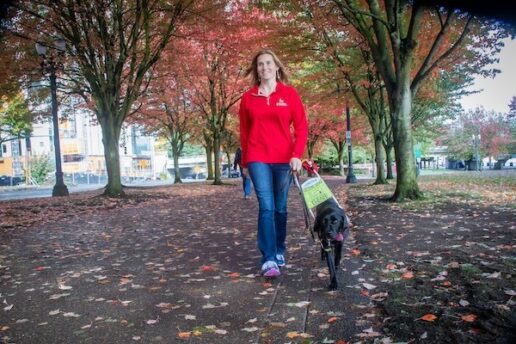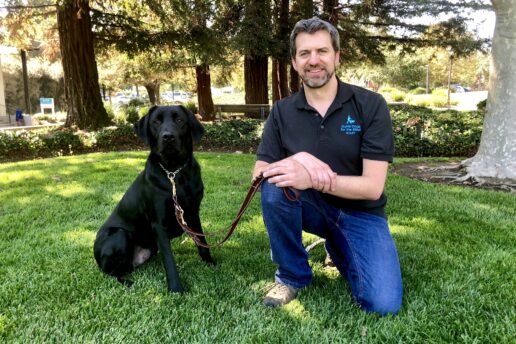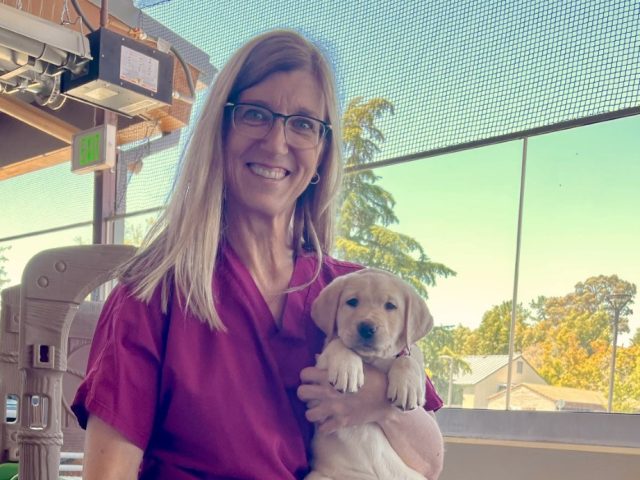Hello everyone and welcome to Central Bark. Today we have a special treat for you. We are doing part two of Frequently Asked Questions, the puppy raising version. And today I'm joined by puppy raising field service manager, Ms. Anne Tyson. Welcome Anne.
Anne: Hi. Thank you. I'm glad to be here.
Theresa: So Anne, I know you've been with Guide Dogs for a long time. Can you tell us a little bit about what you do in your journey here at Guide Dogs for the Blind?
Anne: Absolutely. I started at Guide Dogs for the Blind 12 years ago as what we were called a Community Field Representative back then. And my territory is Washington State, so I live up here and I cover the puppy raisers that have the puppies here in the state of Washington.
Theresa: Oh, fantastic. Wow. Is it raining up there today? I always have to ask.
Anne: Not today. It's been a really nice summer actually.
Theresa: There you go. That's excellent. That's excellent. How many puppy raisers about do you have in your sort of zone that you take care of, anne?
Anne: In my zone, I have up to 75 puppy raisers. Every PFM has approximately 75 to 80 puppies.
Theresa: Wow. That's a lot of puppies to keep track of.
Anne: A lot of fun.
Theresa: And tell me a little bit about the puppy raising program, just sort of how it's organized, so folks kind of get an idea of the support that's out there for puppy raisers.
Anne: Absolutely. So we are organized around an old 4H model. Puppy raising started with 4H clubs and as we transition to our own puppy clubs, we use their model. So we have clubs that are in certain geographic areas, like there's a Seattle Club and there's a San Francisco Club and there's some rural clubs, and each club has a leader and those volunteer leaders are in charge of the volunteer puppy raisers. So there's support at the leader level for the puppy raisers, and then there's support at the puppy raising field manager level for the leaders and for the puppy raisers. So all of our volunteers have a lot of support and there's a lot of expertise behind the support that's given.
Theresa: That's great. Well, let's dig into some of these frequently asked questions. And the first one, and I hear this one all the time, and I'll be interested to see what your answer is to it. It's the top most asked question is how do people raise a puppy? And then how do they make it through having to return the puppy once it's raised back to guide dogs for formal training and how does that work? What kind of support is around that?
Anne: So it is always hard to return the puppy for training, but fortunately we have a lot of raisers who've raised multiple puppies for us. And what they say is that the emotions are outweighed by the possibility the dog they raised could provide enhanced safety, independence, and inclusion for someone who's blind or visually impaired. I like to say it's like a charitable gift of time and love.
Theresa: Oh, I love that.
Anne: And then there's always another puppy waiting to be raised.
Theresa: In the wings, waiting.
Anne: Yeah. Always just give you another one.
Theresa: That's right. That's right. I'm lucky enough to have my current guide dog Wills has amazing puppy raisers from Texas and we still keep in touch with them. So sometimes that happens too, where you drop off a puppy and then you might inherit a whole another little family of friends. Right,
Anne: Absolutely. There's a huge community connection among the puppy raisers as well as among the clients and the volunteers who raised the puppies that became guide dogs. It's more than just an individual experience, it's really a community experience.
Theresa: Great, great. Now, I know that becoming a guide dog is not for every puppy, right? It's a hard job to do. So for the puppies who maybe don't really want to become a guide dog and have other skills, what happens with those dogs that don't become guide dogs?
Anne: Luckily, we have a lot of different career paths for the puppies that don't become guide dogs. One of those is becoming a breeder for our breeding quality. And then we have a wonderful program called Canine Buddy, and that is when the dogs are placed with children or adults who are blind or visually impaired as a companion dog. And those dogs are not trained to do a service, but they live with the person who's blind or visually impaired as a companion.
We also partner with other schools that have services in different areas. So we have partnerships with schools that provide dogs for diabetics and hearing dogs, facilities dogs, PTSD dogs, autism dogs, a big scope of services that these dogs can provide for people.
If the dog doesn't meet any of those career paths, then the puppy raiser is allowed to adopt that dog back as a pet dog or place it with close family or friends. So there's always something for the puppy to do, no matter how it turns out in the program.
Theresa: Wow. That's a great variety of ways that these dogs can really influence and make great impact on people's lives. And I love that part of what we do. I think it's great.
Anne: Yeah, there's so many opportunities that every dog ends up doing exactly what it should be doing.
Theresa: Fantastic. So one of our listeners says that they've never trained a dog before. What skills does a dog need to know when they're in a puppy or learn rather when they're in the puppy raising homes? And how do you teach the people how to do that?
Anne: So I'll answer the first part about what the dogs learn, and then that'll lead right into the second part about how we teach the volunteers to train their puppies. So in the puppy raising program, we focus on some of the foundational skills, which include sit down, stand, stay, come, the basics, as well as teaching the dog to have really impeccable house behavior so that when they go to live with a client that the behavior in the house is really good and that they're settled and quiet and calm in the house. And then the third part of it is teaching the dog to be calm, confident, and manageable in all kind of public situations. So these dogs can go to work and school, they learn how to ride on elevators, they learn how to be in cities, how to walk, where there's no sidewalks. They learn all of the things that will eventually help them become a working guide, but at a puppy level.
Theresa: I love it.
Anne: And so we do that through, we have written materials, we have videos, and then as I mentioned before, we have volunteer leaders who do a lot of the training and supervising on socialization outings, really fun socialization outings that the clubs go on and ride a fairy and go to the pizza parlor and all kind of things that are fun, but also really helpful.
Theresa: That's great. That's great. I can imagine a lot of people going, Well, I've never trained a dog before. How can I do this? But it sounds like there's a lot of support and education that people get as well as the dogs. So that's, I think, probably super helpful.
So the next question really has to do with resources. And this person is asking, what's the cost of raising a puppy? And does guide dogs help with veterinary expenses? Or if there's a pet deposit because they're renting an apartment or something like that. Can you let us know a little bit about that?
Anne: Yeah, absolutely. So Guide Dogs for the Blind covers all of the veterinary care for these puppies. All of the cost of the veterinary care. The puppy raiser would be responsible for things like dog food, toys, husbandry items like bowls and brushes. If there was a pet fee where they were living, they would be responsible for that. We do have some puppy clubs who will help puppy raisers cover some of those additional costs, including food and toys. It just depends on where the club's located and which club would be closest to the volunteer.
Theresa: That makes sense. I think that veterinary cost piece is so helpful with medical expenses for dogs and cats and all animals and all people just going up and up and up. I think that's just fantastic that GDB can cover that for folks.
Anne: Absolutely.
Theresa: Yeah. So this listener wants to know what's co-raising, I guess they've heard about co-raising, but want to know a little bit more about that.
Anne: So co-raising is when two households are responsible for the same puppy. So that puppy will spend some of its time in one household and some of its time in the other household. And that time is split up by whatever makes sense for those two households. So we have some raisers who could only have a puppy on the weekend because they can't take a dog to work or school. And then some raisers who would prefer to have the puppy during the week, but not on the weekend. And so those would be two good households to match up for a co-raising and the puppy would spend the weekdays with one household and then move on the weekend to the other household.
Theresa: That's great. And I imagine it would be good for the dog as well in that it's sort of experiencing lots of different environments as well as, because when they go to their final handler, they might be in a similar environment as one of their co raisers.
Anne: Absolutely. So we'll have households that have children and pets and some that don't, households that live in the city and some that live in the suburbs or the country, and that puppy can get exposed to more things by being in a co-raising situation.
Theresa: Right. And I love that it opens up the opportunity for more people to participate. That's awesome.
So if a person has pet dogs and cats and iguanas and chickens and horses and goats and whatever in their household already, is it possible for them to participate as a puppy raiser?
Anne: Absolutely. All the puppies need to learn how to interact with all kind of different animals and get used to them. So as long as the animals in the household are friendly towards the puppy and towards other animals that come into that home, we absolutely welcome volunteers that have other pets and animals in their household.
Theresa: Great. And then our final question comes from a listener who is not able to take on the responsibility of raising a puppy right now, but wants to know if there are ways that they can be involved.
Anne: Oh, for sure. Clubs have what's called a club volunteer. So that role, they would not necessarily handle the puppies, but they could help with outings or they could help with some of the paperwork or they could help with scheduling, all kind of things like that. We do have a big need for what's called puppy sitters, which are people who don't have a puppy assigned to them personally.
But when puppy raisers need someone else to watch the dog because they're traveling to a place that they can't take the puppy, or they have an event they need to go to where the puppy isn't able to go, our puppy sitters can take those puppies for a weekend or even up to a couple of weeks, you still get the opportunity to interact with a puppy without having the long term commitment to raise a puppy full time.
Theresa: That sounds like fun. I might have to look into that. Sort of like rent a puppy.
Anne: Yeah. We always need puppy sitters, so they are definitely a valuable resource for our puppy raisers.
Theresa: Yeah, I have to say that the puppy raisers, they're just as a person who has a guide dog, puppy raisers are really the heroes. I think the superheroes of Guide Dogs for the Blind and the contribution that they make, it's so selfless and just changes lives. And I want to thank you so much for your leadership in your role. Just want you to know, and all the puppy raisers out there, how much of a difference it's made in my life along with all the other graduates from Guide Dogs for the Blind.
Anne: Well, thank you so much. We love what we do. All of us love what we do, and we love making a difference, and we love the organization and the puppies too, so thank you.
Theresa: Well, thank you, Anne. Thank you for being here and I hope everybody got their questions answered. And if not, then just shoot us an email.
For more information about Guide Dogs for the Blind, please visit guidedogs.com.
Related Episodes




